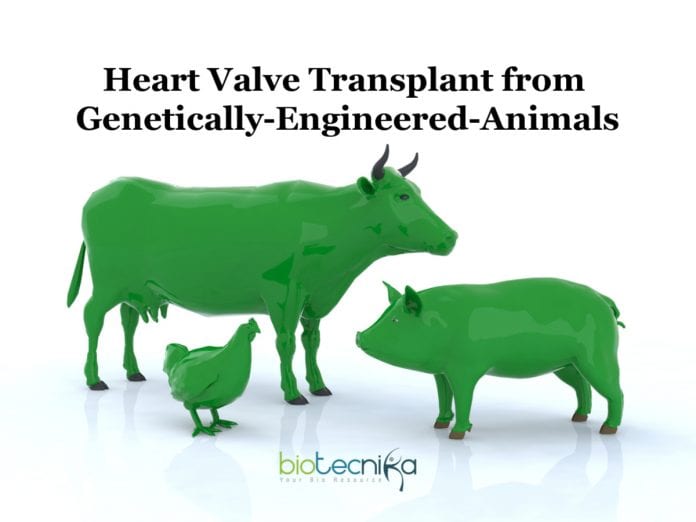Heart Valve Transplant with Genetically-Engineered-Animals
Scientists have cloned a genetically-engineered bull for treating heart-valve transplant patients. This would benefit people with red meat allergies and heart valve transplant patients to lead better quality lives.
Each year, around 300,000 people receive a new heart valve worldwide. As synthetic valves can cause blood clots, whenever possible, the doctors use valves made of tissue from pigs or cows.
But this comes with a problem. Even though the animal tissue valves can last up to 30 years in 60 years and above age group people, in younger people, due to their aggressive immune system, these animal tissue valves could be destroyed in just five years.
Welcome the new genetically engineered bull.
Two bovine mutations, which can reduce people’s immune responses to the animal tissue, has been created by researchers using the gene-editing technology- CRISPR.
The two sugars, which are found in bull’s cell but not found in humans, are knocked out by the mutations: Neu5Gc and α-Gal.
The coordinator of a project called TRANSLINK, Dr. Emanuele Cozzi said, ” The goal is to have animals that express tissues which are less foreign to the human body.” This project has been trying to improve the
long-term success of heart valve transplants. At Padua University Hospital in Italy, the director of the Transplant Immunology Unit, Dr. Cozzi added, ” This means in theory, to make people’s immune system less likely to attack the animal tissue.”Clone
Avantea, an Italian company, as a part of the project created bovine cells with the two mutations and used them to clone a bull with a similar technique used to create the sheep, Dolly.
The co-founder of Avantea, Professor Cesare Galli, said ” With these mutations, we are the first to make a cattle using them. To make founder animals, the cloning step is required and then they can breed normally.”
Before CRISPR was available, using Transcription activator-like effector nucleases (TALEN) technology, Avantea had created the same mutations in pig cells to edit the DNA.
Prof. Galli said, “The reagents required to implement the system are easily prepared with CRISPR. As reagents can be made in-house, CRISPR is very cost-effective. But it is less accurate in theory. There is a risk that is yet to be quantified, a risk of undesired cuts as it is less precise in recognizing the sequence to be cut. At least for people who have red meat allergies, the animals we create could have a potential application for food consumption.
Quality of life
People who are too young to receive the animal tissue, about 100,000 people are given synthetic heart valves in a year. These young patients have to live on anticoagulants because these synthetic valves can cause dangerous blood clots. They have to avoid sports and jobs with a high risk of injury, like police work or construction. If at all there is an accident while on duty, they might bleed to death.
Dr. Cozzi says, ” Before recommending the genetically-engineered-animal tissue, researchers need more solid evidence even though preliminary data showed that people’s immune systems attack valve transplants in response to the animal tissue used.
TRANSLINK is carrying out the largest of its kind study to understand more, involving 1600 cardiac patients for comparing their immune responses to synthetic or animal tissue valve transplants or other surgery types. Next year, the results are expected.
Dr. Cozzi said, “It should not be hard to find potential investors who can bring genetically-engineered tissue valves to the market if the study shows that immunology is the reason behind the premature animal-derived heart valve’s failure. Based on our study’s data, my hope is to change the outlook of young patients and offer them life with better quality.”
Red meat allergies
People having red meat allergies would be benefited from these cloned animals. Researchers consider α-Gal sugar as the main culprit, which is found in all animals other than primates.
A reaction, which ranges from an anaphylactic shock to a skin rash can be triggered by anything from collagen to steak used in cosmetics.
Any possible links between cancer and Neu5Gc sugar are also studied by some scientists in the US. Even with limited evidence, red meat has been classified as carcinogenic to humans, by The World Health Organization.
Humans developed a mutation millions of years ago, and this stopped the Neu5Gc production and produced Neu5Ac instead, a slightly different sugar. The mutation spread quickly across the population and made people resistant to malaria.
Prof. Galli says, ” Animals including sheep, pigs, cows and other mammals except for some dogs and deers, produce the Gc form which is ‘highly antigenic’ in humans, prompting a strong immune response. Fish and chicken do not and they are considered healthier to consume. As the cloned cows do not carry the antigen, the cows can be used as a source of milk for baby food and it would be similar to human milk. Like the pigs and cows, Avantea also plans to use CRISPR to create horses with the same mutations. He says the horse serum used in making antidotes to snake bites can trigger adverse reactions in some people and eliminating the Neu5Gc and α-Gal may prevent this reaction.
To improve human health, there is a huge potential from cloned cows, pigs, and horses. But for now, most of it is still a theory.
Prof. Galli said, ” Now we have the tools, but we should put in work to prove if this is an advantage or not.”
The EU funded this research study.
Editors Note – Heart Valve Transplant with Genetically-Engineered-Animals, New Heart Valve Transplant with Genetically-Engineered-Animals by Scientists.
Author: Prathibha HC






























